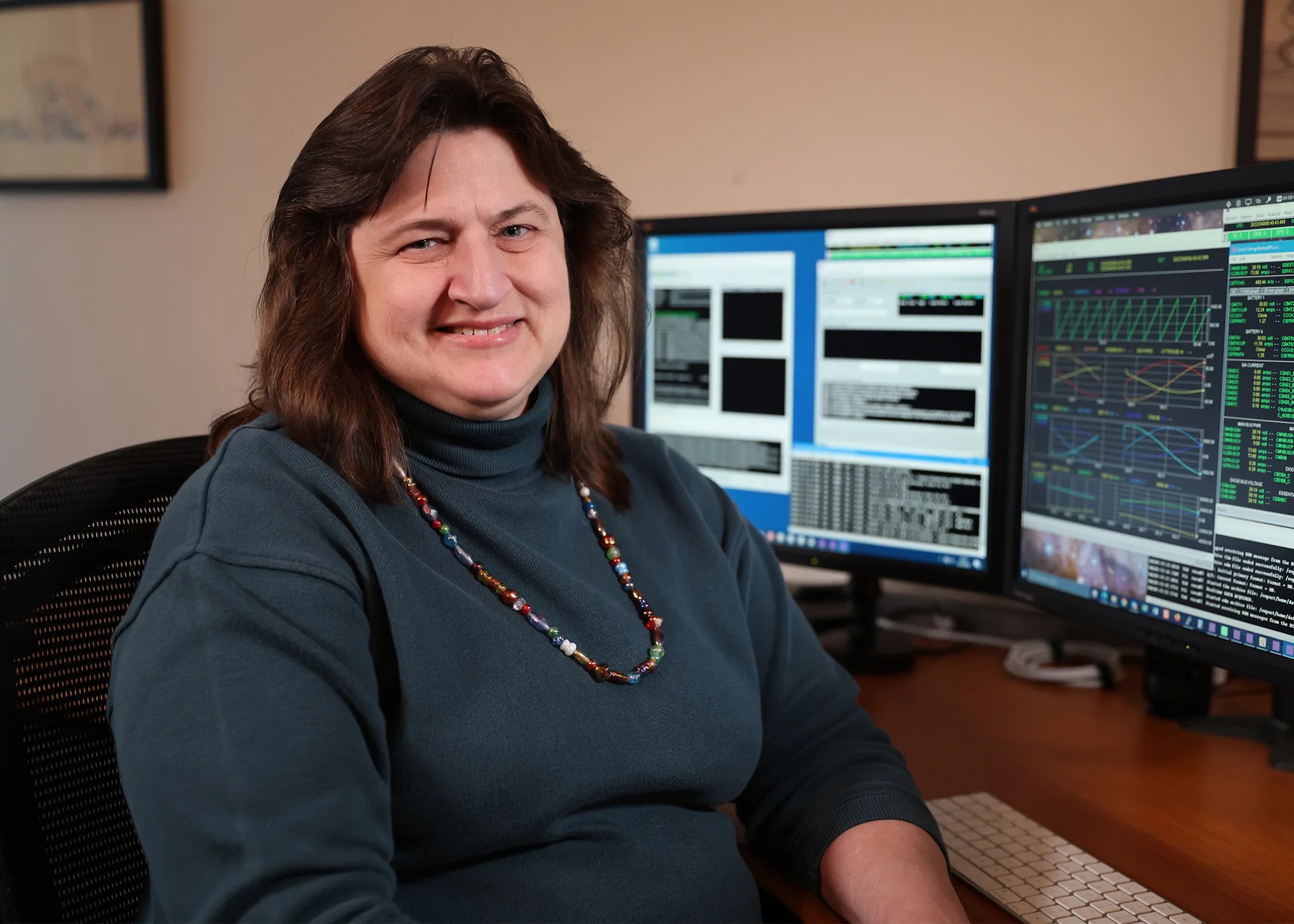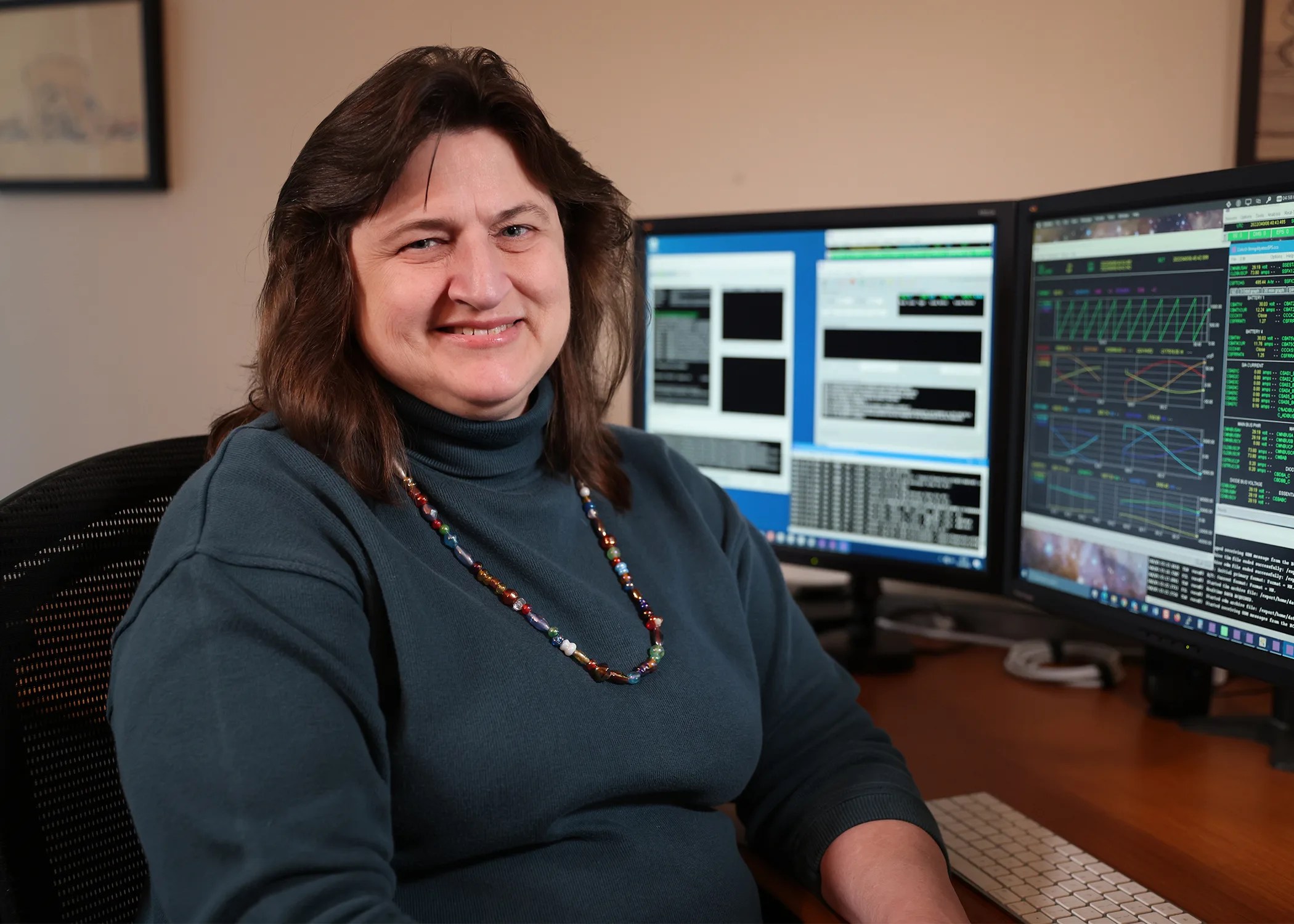
Lori Yates
Software Developer
Keeping the Hubble Space Telescope in orbit above Earth’s atmosphere is no easy feat, requiring a team with diverse expertise. A team of mission controllers on the ground monitors both the flight and ground systems that keep the telescope ticking. Lori Yates works with the backbone of the ground system: the command code.
As a software developer for the Hubble Space Telescope, Lori writes command code for the Control Center System (CCS), which helps monitor Hubble’s operations from the ground. In addition, she brings all of the CCS code together to make the CCS system. “With a systems integration role, you end up being a jack of all trades for the ground system because you wind up doing a lot of debugging to figure out where the problems are in the system,” she said. “I see my role as sort of a facilitator. My job is to support my team and give them what they need to do their jobs. We all have one job to do, and that is to keep the spacecraft flying.”
Curious about the cosmos from a young age, Lori’s innate passion for space exploration set her on a path to Hubble. “I come from a scientifically oriented family, and my mother swears I was influenced in the womb to work in space,” she recalled. “My parents woke us up when we were little kids to watch Neil Armstrong walk on the Moon, and I grew up on Star Trek and reading Carl Sagan’s ‘Cosmos’ in addition to science fiction novels. I’ve always really loved space and dreamed of being an astronaut.”
We stay here because it’s Hubble ― it’s our baby and it’s our job to take care of it.

Lori Yates
Software Developer
After obtaining her bachelor's degree in aerospace engineering from Pennsylvania State University, Lori found it challenging to break into the aerospace industry. Following the devastating accident of the Space Shuttle Challenger in 1986, there were few jobs in the field. Deciding to go back for a second degree in computer science, she worked a side job delivering pizza to help pay for her education. Upon completing her degree, she spent over four years working on smaller NASA missions, then a year and a half in the telecommunications field before rejoining NASA in 1996.
For Lori, dedication and perseverance were key. “I started off wanting to work for NASA right away, but the first time I applied, it just didn’t work out. Through a roundabout way, working on various ground systems, I finally got there, which is not uncommon for a lot of people in the engineering field.”
Gaining that well-rounded background is Lori’s advice for aspiring engineers. With complex spacecraft ― like Hubble ― having a technically oriented science degree with the ability to understand systems outside of your area of expertise places you in a better position to troubleshoot problems when they arise.. “If you are interested in engineering, I would recommend gaining some computer science as well. Even when I was graduating from college, engineers were required to know programming more and more. So the better your computer skills, the better an engineer you’ll be.”
Since joining NASA, Lori has been through ups and downs with the Hubble team, but her most memorable moments were getting to see her work in action. She recalled her awe at watching the astronauts as they operated on the spacecraft during her first Hubble servicing mission, Servicing Mission 3A. “I was extremely excited but also nervous because it was the first time my software was used on a mission like that,” she said. “My software was essentially the user interface command, so I was terrified that something might go wrong, but it was very rewarding in the end to see the mission succeed. For me, that’s why I’ve been here so long. I take it very seriously and give my absolute best on my software.”
Lori has been on the Hubble team for over 20 years, working diligently behind the scenes as Hubble racks up more and more cosmic images, observations, and discoveries. “Hubble has a habit of doing that with people,” she said. “We stay here because it’s Hubble ― it’s our baby and it’s our job to take care of it.”

